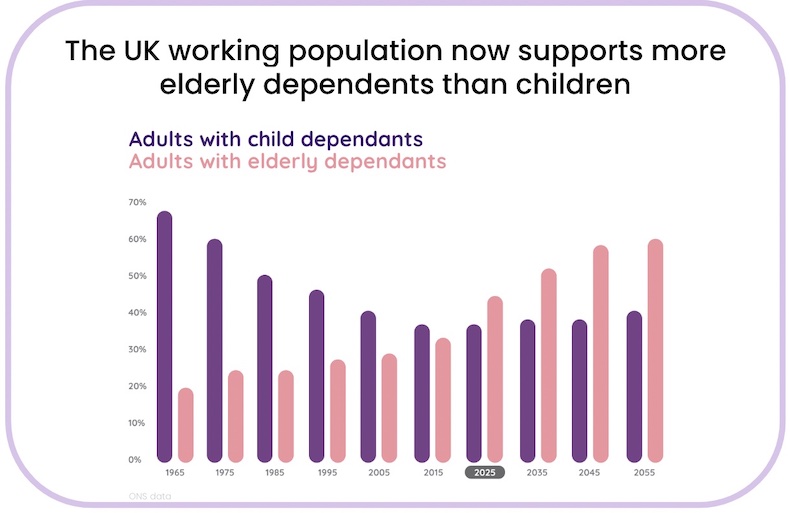3 ways to future proof your workforce in an age of elderly caregiving
People are living longer than ever before.
Life expectancy for those born in the UK today is 79.9 years for men and 83.6 years for women. These extra years may force the retirement age to be raised, but they also mean fewer parents will be snatched away mid-life, grandparents will be around for longer and great-grandparents will meet their great-grandchildren.
Families and workforces are set to change dramatically. Becoming a carer for an elderly loved one at some point in our lives is no longer ‘if’ but ‘when’.
Ageing population
A profound change is happening — fewer children are being born and more people are living longer, with the result that there are more older people and fewer younger people.
The working population now supports more elderly dependents than children yet organisations don’t provide reward schemes that match this new norm.

Source: Office for National Statistics
Impact on society
Who is going to care for the older people and how does society manage the increased healthcare demand?
There is a rise in age-related diseases that tend to be chronic and, the longer we live, the more of them we get. Society has to adapt quickly. We constantly hear that we must adapt to AI, to sustainability … but we’re just meant to accept that ageing also creates problems.
Your employees will be responsible for delivering the additional care needs of our ageing population
Families provide most care received by elderly relatives due to high care costs in both the public and private sector. As people have fewer children, the question of who will care is even more pertinent. The age of carers will also trend downwards — as people have fewer children, they will spend less time on parental leave and more time caring for someone older.
The effect on the workplace
Organisations will lose talent if they do not provide the right support and flexibility. It’s essential organisations understand and recognise that an increasing number of their employees will become carers. One in five UK employees are balancing their jobs with responsibilities of care. This is an endemic issue for organisations and it’s leading to people quitting their jobs already.
Recruitment and retention strategies obsess over young people but forget the fastest growing area of the labour market is the over-50s. When they leave, companies lose years of experience and specialist knowledge. They’ll particularly notice a large loss of older workers due to their caring responsibilities, illnesses or retirement plans. The need for flexible working options is going to increase rapidly as people try to balance work with caring responsibilities.
An increase in caring demand could worsen the gender pay and pension gap.
In theory, an ageing population should help equalise things. If everyone takes time off or works flexibly to provide care, no one would be penalised for time away from work. And a longer life means reproductive years represent a smaller proportion of a lifetime which should minimise the effect they have on a woman’s career.
The danger, however, is that caring is just tacked on to women’s labour and it creates a whole new area of inequality. As it is, women are four times more likely to reduce their working hours (or quit) because of adult caring responsibilities.
New laws to support carers
The Carers Leave Act and Flexible Working Act signals the importance of adult care and goes a long way to normalising it. But five days leave a year isn’t much time and it’s unpaid.
The act is likely to evolve over time as parental leave did — that wasn’t originally paid time off either. In fact, the notion of parental leave will likely change radically. As people have fewer children, parental leave will mean taking leave to look after parents or even grandparents. Like traditional parental leave, there will probably be mandatory government requirements, but some companies will provide benefits on top of that.
How to help future-proof your business
Finding support solutions to help people balance their work and caring responsibilities is key:
1. Offer people extra leave as a benefit. This could be a credit system.
2. Develop flexible working policies that work for your business and employees. Returning to the office five days a week is not sustainable for carers.
3. Recognise and support elderly caregiving. Caring takes a big toll on a carer’s personal life, their mental health and their career. People often don’t quite realise just how enormous an obligation it is and the impact it has. Companies can offer mental health support, peer support groups, company-wide coaching on the topic and practical support solutions like KareHero’s care concierge service.
Based on an interview with Andrew Scott, summer 2023. Scott, London Business School Economics professor, is an authority in longevity. His international bestseller, The 100-Year Life, explores the challenges and opportunities of living longer.
Supplied by REBA Associate Member, KareHero
The #1 adult caregiving support service. Helping employees understand, find and fund their care journey.








